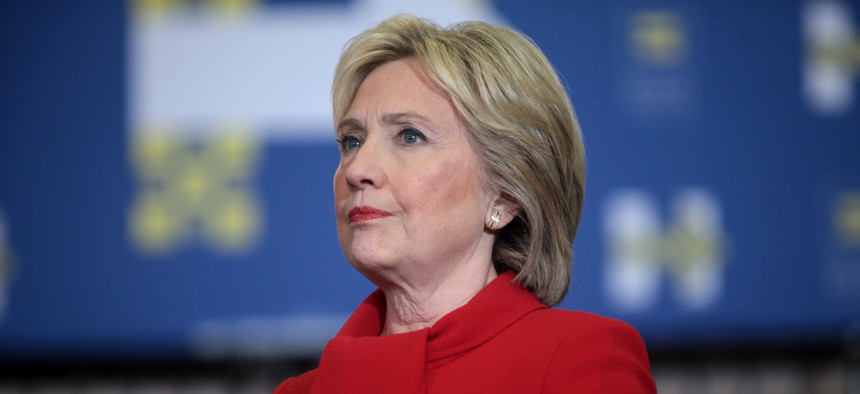
Flickr user Gage Skidmore
Republican Leaders Won’t Back Smith’s Probe of Clinton Emails
The House Science chairman has launched his own investigation into the security of Hillary Clinton’s messages, but it’s not clear whether the leadership is on board.
House Majority Leader Kevin McCarthy indicated Monday that a longtime House chairman overstepped his jurisdiction when he launched an investigation into former Secretary of State Hillary Clinton’s private email server last month.
Science, Space, and Technology Chairman Lamar Smith is probing whether private contractors who set up Clinton’s server at her New York home followed federal cybersecurity guidelines. But McCarthy said he believes the matter to be under the purview of Rep. Trey Gowdy’s Select Committee on Benghazi.
“I have the same impression as you, that it would be Gowdy’s jurisdiction,” McCarthy said, declining to answer whether Smith had pre-cleared the investigation with leadership.
Smith’s office also declined to answer whether he notified party leaders before sending letters asking for more information to four private companies that helped set up the Chappaqua, New York server. But Smith spokesman Zachary Kurz said the chairman is following up on a cybersecurity hearing he held last month.
“During the hearing, the chairman had an exchange with a private-sector witness who stated unequivocally that a federal official using a private server and email address as her official government email risked exposing classified data and that his company wouldn’t do it because of federal laws and cybersecurity guidelines,” Kurz said. “Based on that testimony, the chairman determined that further oversight was necessary.”
Smith is facing a primary challenge this fall from a tea-party-backed challenger, Matt McCall, who failed to unseat him last year. The Cook Political Report rates the district an R+12, meaning it is solidly Republican. The Texas delegation was shaken last year when 17-term Rep. Ralph Hall surprisingly lost his primary election in a runoff to former U.S. Attorney John Ratcliffe.
The Clinton investigation has been a sensitive topic since its inception, and especially since McCarthy was roundly criticized for insinuating on television that the Benghazi Committee has succeeded in politically damaging Clinton—comments he later retracted.
Former Speaker John Boehner had launched the Benghazi committee to streamline the investigation and avoid a patchwork of probes into the Benghazi attacks. He also ensured that after news of Clinton’s private email server came to light, inquiry into the setup would remain with the Benghazi panel. But with Boehner retired and his successor, Speaker Paul Ryan, promising wider latitude to committee chairs, there appears to be less centralized control.
McCarthy’s latest comments arrive amid intense interest in Clinton’s emails among Republicans, especially in light of new State Department revelations several days ago.
On Friday the State Department said it was withholding seven email threads totaling 37 pages from its latest release of Clinton’s emails because they contain a “category of top secret information.” However, the department said the messages were not marked classified when they were sent.
Clinton’s campaign attacked the decision to withhold the messages, calling it “over-classification run amok.”
“We understand that these emails were likely originated on the State Department’s unclassified system before they were ever shared with Secretary Clinton, and they have remained on the department’s unclassified system for years,” said Brian Fallon, Clinton’s press secretary.
Clinton’s email setup is already under investigation by the Senate Judiciary Committee and Homeland Security Committee. Days after Smith announced his probe, House Oversight and Government Reform Committee Chairman Jason Chaffetz announced that he was looking into whether the State Department obstructed Freedom of Information Act Requests under Clinton’s tenure.
The Benghazi panel’s probe played a key role uncovering Clinton’s use of a private server, although that probe is more directly focused on the 2012 attacks in Libya.
(Image via Flickr user Gage Skidmore)






